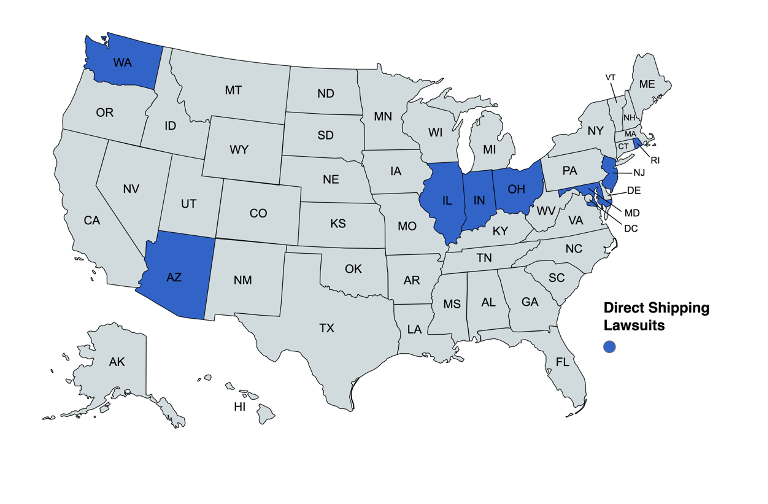
I recently spoke at the National Association of Wine Retailers’ (NAWR) 2024 Summit, updating members on the latest developments in eight (8) active lawsuits challenging restrictions on direct-to-consumer alcohol shipping. These cases target discriminatory state laws that favor in-state businesses. They involve winery, brewery, and distillery shipping as well as retailer shipping.
Direct shipping rights are important to domestic and foreign producers, retailers, and consumers. If industry members prevail, they will significantly expand market access to retailers and consumers in other states. Here’s the latest on each of the eight cases:
#1. Arizona/Ninth Circuit: Day v Henry
Day v. Henry challenges an Arizona law allowing only in-state wine retailers to ship wine directly to Arizona consumers. It was filed in July 2021.
On August 9, 2023, the District Court granted summary judgment for Arizona. It held requiring retailers to have a physical premises in-state is a fundamental aspect of the three-tier system. It serves Arizona’s legitimate interests in policing and maintaining that system. The District Court reasoned the Arizona law did not discriminate because out-of-state retailers are equally eligible to obtain an Arizona retail license. Notably, it interpreted the Supreme Court’s holding in Granholm to apply to wineries only, not retailers.
Industry members appealed the case to the Ninth Circuit. Since then, the parties have filed their opening, answering, and reply briefs. They are currently waiting for a date for oral argument. The Day case is particularly important because the Ninth Circuit has not yet ruled on discriminatory alcohol laws.
#2. Washington: Shady Knoll Orchards & Distillery v. Postman
Shady Knoll Orchards & Distillery v. Postman challenges a Washington law allowing only in-state distillers to ship directly to retailers and consumers. It was filed in June 2023.
On October 24, 2023, the District Court declined to dismiss the case, noting there was a split of authority among Circuit Courts on discriminatory alcohol laws. The District Court ruled:
“Defendant invites the Court to dismiss the case on the basis that, since Granholm and Tennessee Wine were decided, other courts of appeals—namely, the Fourth, Sixth, and Eighth Circuits—have apparently allowed the creation of three-tier systems ‘with limited exceptions … in which [distributors] can play multiple roles,’ including state physical presence for direct sales. However, Plaintiff retorts that courts in the First, Seventh, and Eleventh Circuits have reached the opposite conclusions. Plaintiff also represents that the Ninth Circuit has not squarely confronted these issues. Even accepting Defendant’s claims that some post-Granholm authority exists which would support a discriminatory in-state physical presence requirement, the existence of a circuit split compels the Court to stay its hand. At this stage, Defendant has not shown that Plaintiff’s allegations, if proven true, fail to state a plausible claim to relief.”
Since then, the parties have been conducting discovery and preparing motions for summary judgment.
Circuit court splits make it harder for courts to apply the law. They lead to inconsistent and unfair results for similarly situated litigants, and they increase uncertainty for all market participants.
#3. Illinois/Seventh Circuit: Freehan v. Berg (formerly Lebamoff v. Rauner)
Freehan v. Berg challenges an Illinois law allowing only in-state wine retailers to ship wine directly to Illinois consumers. It was originally filed in 2015.
Back in November 2018, the Seventh Circuit overruled the District Court’s dismissal of the industry members’ claim. It held Granholm applies beyond the producer tier. It ruled:
“Limiting licenses to in-state storefronts might make sense if all sales had to be on an in-person basis. The great majority of out-of-state retailers would have no use for such a license, and the failure of the state to offer it would raise no eyebrows. But once the license allows a store to ship product anywhere within the state, refusing to extend that privilege to out-of-state businesses is facially discriminatory.”
The Seventh Circuit sent the case back to the District Court with instructions to hear evidence about the discriminatory impact of the law and Illinois’ nonprotectionist justifications. Although the original plaintiff, Lebamoff, sold its business, new plaintiffs refiled the case in Illinois District Court in October 2021. The parties are currently preparing motions for summary judgment.
#4. Indiana/Seventh Circuit: Chicago Wine v. Holcomb
Chicago Wine v. Holcomb challenges an Indiana law allowing only in-state wine retailers to ship wine directly to Indiana consumers. It was filed in July 2019.
In March 2021, the District Court granted summary judgment for Indiana. It ruled the Indiana law advances public health, protects against unsafe or counterfeit products, and keeps alcohol out of the hands of minors. It reasoned there was no discrimination because both in-state and out-of-state retailers must obtain inventory from in-state wholesalers, and both are equally eligible for Indiana wine retailer permits.
In December 2021, the Seventh Circuit heard oral arguments. But on June 16, 2022, Judge Kanne, part of the three-judge panel, died. Unfortunately, no one has heard a word from the Court since oral arguments. The wheels of justice in the Seventh Circuit move slowly…
#5. Maryland: Furlong v. Brown
Furlong v. Brown challenges a Maryland law allowing only in-state alcohol manufacturers to ship directly to consumers. It was filed in July 2023.
On March 15, 2024, the District Court declined to dismiss the case. It held:
“[I]f a state’s three-tier system is posited as a legitimate nonprotectionist ground for discriminating against out-of-state commerce, the system must not be undermined by the law in question. In this case, [the law] subverts the three-tier system by allowing in-state, but not out-of-state, manufacturers to bypass the three-tier system and ship directly to consumers.”
Maryland is in the Fourth Circuit, which previously upheld a discriminatory retailer shipping restriction as necessary to maintaining the three-tier system, confining Granholm to producer shipping. (B-21 Wines, Inc. v. Bauer, 36 F.4th 214, 229 (4th Cir. 2022).) But in Furlong, the District Court distinguished B-21 Wines:
“[W]hereas the law in [B-21 Wines] ensured “that all wine sold to North Carolina consumers by retailers goes through the State’s three-tier system,” in this case the Act undermines the three-tier system by allowing Maryland manufacturers to bypass wholesalers and retailers altogether.”
If producers can change direct shipping law in the Fourth Circuit, then they can affect the balance of the circuit court split, though the Fourth Circuit may continue to distinguish between producer and retailer shipping.
Since the District Court ruled two months ago, the parties have been conducting discovery.
#6. New Jersey/Third Circuit: Weg v. Graziano
Weg v. Graziano challenges a New Jersey law allowing only in-state wine retailers to ship directly to consumers. It was filed in July 2019.
On August 22, 2023, the District Court granted summary judgment for New Jersey, upholding the ban on wine shipments from out-of-state retailers. It held the law is not protectionist because it requires the same licenses for in-and out-of-state retailers, all of whom must have a physical presence in New Jersey. It was persuaded by New Jersey’s concerns that it could not inspect the premises of out-of-state retailers, uncover their connections to organized crime, or determine if illegal sales to minors occur there.
Industry members appealed to the Third Circuit, where the parties have filed their opening, answering, and reply briefs. They are currently waiting for a date for oral argument.
#7. Ohio/Sixth Circuit: Block v. Canepa
Block v. Canepa challenges an Ohio law allowing only in-state wine retailers to ship directly to consumers. It also challenges Ohio’s transportation limit, which bars consumers from receiving more than 4.5 liters (six 750 ml bottles) of shipped wine from outside Ohio during any 30-day period. It was filed back in July 2020.
On July 14, 2023, the Sixth Circuit sent the case back to the District Court to weigh evidence of a nonprotectionist ground for the discriminatory law. It ruled:
“The district court failed to consider Plaintiffs’ evidence in this case concerning Ohio’s Direct Ship Restriction. Instead, it treated Lebamoff [v. Whitmer]’s holding – which dealt with a different state’s law and involved different evidence – as dispositive . . . Lebamoff did not hold that direct ship restrictions are always constitutional.”
Instead, the Lebamoff court upheld Michigan’s discriminatory law because the plaintiffs failed to refute evidence the law “serves the public health.”
This case is now back before the District Court, where the parties are filing motions for summary judgment.
Block may affect Circuit Court splits on both the transportation limit and the direct ship restriction. A decision invalidating the direct ship restriction would overturn or further limit the Sixth Circuit’s 2020 decision in Lebamoff v. Whitmer. The Sixth Circuit’s Block decision has already weakened Lebamoff as persuasive authority.
#8. Rhode Island/First Circuit: Anvar v. Dwyer
Anvar v. Dwyer challenges Rhode Island’s requirement that retailers and wholesalers maintain physical presence in-state as discriminatory. It was filed in October 2019.
On September 7, 2023, the First Circuit reversed the District Court’s grant of summary judgment in Rhode Island’s favor, directing the District Court to consider evidence supporting a nonprotectionist ground for the law. It ruled:
“[T]here is nothing inherent in the three-tier system—which aims at preventing vertical integration between alcohol producers, wholesalers, and retailers—that necessarily demands an in-state-presence requirement for retailers. Such a requirement—if it is to be sanctioned—must be supported by ‘concrete evidence’ demonstrating that its predominant effect advances the goals of the Twenty-first Amendment and not merely the protection of in-state business interests.”
The case is now back before the District Court, where the parties are doing an additional round of discovery, after which they will submit new motions for summary judgment.
Industry Members owe a big thanks to the National Association of Wine Retailers (NAWR) for supporting these lawsuits!
This informational piece, which may be considered advertising under the ethical rules of certain jurisdictions, is provided on the understanding that it does not constitute the rendering of legal advice and does not form an attorney-client relationship. You can unsubscribe from future messages by replying “unsubscribe” to this message.




